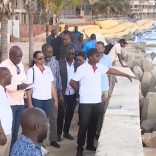Mozambique: Human behaviour main factor for coastline destruction in Inhambane - AIM report | Watch
Covid-19: Rise in cases leads to the adoption of new measures in Mozambique – Watch

Photo: Noticias
Mozambique will, for a period of 21 days, starting/tomorrow [January 15], observe a new set of restrictive measures imposed by the government and designed to halt the progress of the new coronavirus.
In an address to the nation yesterday evening, President Nyusi announced new rules and retightened some which had been eased in December. This is the direct consequence of an almost general negligence of Covid-19 restrictions, which has resulted in an exponential increase in the number of confirmed cases in the last few days.
Only yesterday [January 13], 730 new cases were registered across the national territory, of whom 21 were admitted to isolation and treatment centres and four died. A total of 140 people are hospitalised in specialised Covid-19 treatment centres and other health units, leading to fears of a possible collapse of the National Health System, mainly in Greater Maputo, which has the highest percentage of cases.
The president, who described the data from the past few days as “a red light”, announced that the number of participants in private events would be limited to a maximum of 30 people in closed spaces (against the 50 announced in December in the context of the declaration of the state of disaster) and 50 in open spaces, against the 150 previously allowed. The president also announced a reduction in the number of participants allowed at funerals to just 20, and only ten if the person died of Covid-19. Religious services can now have only 50 participants, regardless of where they occur.
Commercial activity in the catering and leisure sectors saw the most severe restrictive measures. Restaurants and other eateries may operate from 6:00 a.m. to 8:00 p.m. Monday to Friday, and from 6:00 a.m. to 3:00 p.m. on Saturdays and Sundays, with their capacity restricted. Bottle stores are to open from 8:00 a.m. to 1:00 p.m. only, and must remained closed on Sundays, while stores (supermarkets) may not sell alcoholic beverages after 1:00 p.m..
Cinemas, theatres, museums, galleries, cultural centres, auditoriums and in tourist venues are to close, along with gyms and public pools. Beaches will be closed, while promenades and spaces defined for pedestrians may still be used, but without gatherings forming.
National sporting championships will be allowed to continue, but without the public present. National teams may train, provided that the new coronavirus prevention measures are scrupulously observed.
President Nyusi said the authorities would be punctilious in monitoring compliance with the new measures, and called on all citizens to be zealous in their compliance.
“Failure to comply with the measures constitutes transgression and disobedience, punishable under the law,” President Nyusi said, warning that the Defence and Security Forces and the National Inspection of Economic Activities (INAE) would be especially active in monitoring and imposing sanctions against offenders.
The issuing of documents such as driving licenses and identity cards has been a problem for both the public and the responsible authorities, since, due to high demand, Covid-19 preventive measures have not always been observed. President Nyusi thus announced that expired documents of this type would remain valid until May 31, while demanding that issuing institutions improve their arrangements, to avoid overcrowding.
The head of state also suspended, again because of overcrowding, in-person professional registrations and proofs-of-life, which he said should be carried out using alternative means.
The president’s announcement followed an extraordinary meeting of the Council of Ministers, which approved a specific decree on the new package of measures to combat the new coronavirus. This decree follows another, dated December 17, which instituted a state of public calamity due to the pandemic. At the time, the country relaxed some measures in order to revive the economy, badly affected by the restrictive measures imposed since the country’s first Covid-19 case, notified in March last year.
Filipe Nyusi pointed out the need to change the behaviour of the many citizens who were “purely and simply” neglecting their responsibility to protect themselves and their neighbours.
“We will not tolerate these affronts, because we want to defend life and not neglect it,” he stressed, while reiterating his warning that the Defence and Security Forces would pursue relentlessly those who failed to comply.
Nyusi praised the health professionals at the forefront of fighting the disease, who, he said, had been working under a pressure that, in his opinion, could be mitigated if citizens did their part.
“We do not want health professionals to continue to be put at risk, or exhaust the capacity of our National Health System,” he stressed.











Leave a Reply
Be the First to Comment!
You must be logged in to post a comment.
You must be logged in to post a comment.